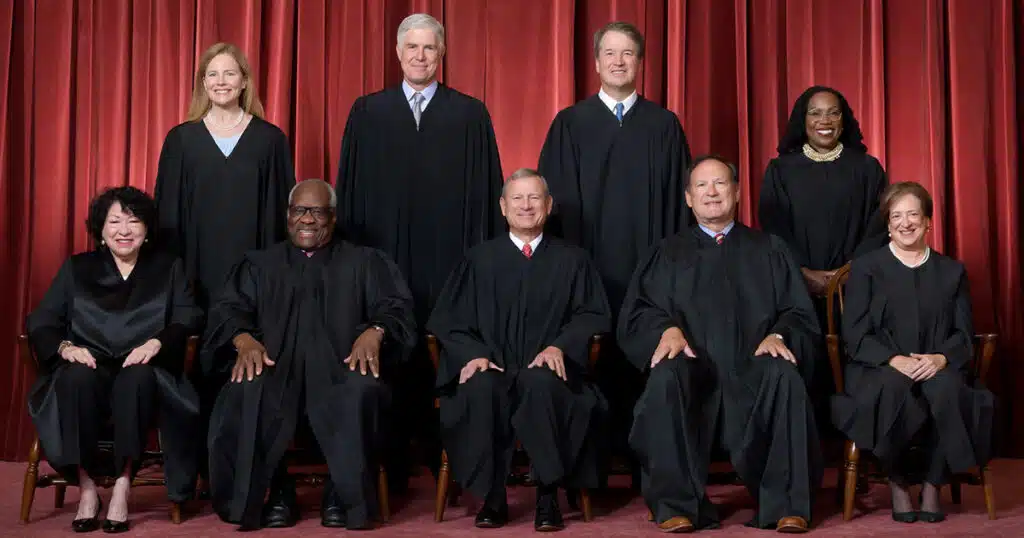
Supreme Court Rules on Whether States Can Protect Kids From Transgender Procedures
The Supreme Court ruled Wednesday that states have the constitutional right to pass laws protecting children from irreversible transgender medical interventions.
In a 6-3 ruling the court upheld a Tennessee law prohibiting minors from attempting to medically change their sex.
Chief Justice John Roberts delivered the opinion of the court, in which Justices Clarence Thomas, Neil Gorsuch, Brett Kavanaugh, and Amy Coney Barrett joined. Justice Samuel Alito, a George W. Bush appointee, agreed with large parts of the opinion. The court’s three liberal justices—Sonia Sotomayor, Elena Kagan, and Ketanji Brown Jackson—dissented.
The court held that Tennessee’s law “satisfies rational basis review,” rejecting plaintiffs’ claims that the law discriminates against people on the basis of gender identity.
Tennessee Gov. Bill Lee, a Republican, signed SB1—a bill banning puberty blockers, hormone replacement regimens, and transgender surgeries for children—into law on March 22, 2023.
In April 2023, the American Civil Liberties Union sued the state of Tennessee on behalf of Samantha and Brian Williams, whose 15-year-old son says he identifies as a transgender girl.
The Biden-Harris administration joined the lawsuit, contending that Tennessee’s law is unconstitutional.
The defendant in the case is Tennessee Attorney General Jonathan Skrmetti, a Republican.
The court ruled that Tennessee determined these interventions, euphemistically referred to as “gender-affirming care,” carry “risks, including irreversible sterility, increased risk of disease and illness, and adverse psychological consequences,” the court noted. “The legislature found that minors lack the maturity to fully understand these consequences, that many individuals have expressed regret for undergoing such treatments as minors, and that the full effects of such treatments may not yet be known,” and that “discordance between sex and gender can be resolved through less invasive approaches.”
The court ruled that the law’s “age- and diagnosis-based classifications are rationally related to these findings and the state’s objective of protecting minors’ health and welfare.” The court further rejected “plaintiff’s invitation to second-guess the lines that SB1 draws.”
While Roberts, the chief justice, admitted that “it may be true … that puberty blockers and hormones carry comparable risks for minors no matter the purposes for which they are administered,” he noted that it may also be true “that those drugs carry greater risks when administered to treat gender dysphoria, gender identity disorder, and gender incongruence.”
Roberts noted that SB1 is “limited” in that it “does not restrict the administration of puberty blockers or hormones to individuals 18 and over,” and that it “does not ban fully the administration of such drugs to minors,” but only for “gender dysphoria,” gender identity disorder, [and] gender incongruence.”
Roberts also cited the Cass Review and the determinations of England’s National Health Service, not because these are determinative for U.S. law, but “to demonstrate the open questions regarding basic factual issues before medical authorities and other regulatory bodies.”
The ACLU argued that the Supreme Court’s ruling in Bostock v. Clayton County (2020), which forbade employers from firing workers due to their sexual orientation or gender identity under the logic that such firings involved discrimination on the basis of sex, should forbid Tennessee from enacting SB1, claiming that it violates the 14th Amendment’s equal protection clause. Bostock relied on a “but-for” reasoning, claiming that a male employee fired for sexual relations with other men would not be fired if he were female.
Yet the court ruled that “changing a minor’s sex or transgender status does not alter the application of SB1. If a transgender boy seeks testosterone to treat his gender dysphoria, SB1 prevents a health care provider from administering it to him. If you change his biological sex from female to male, SB1 would still not permit him the hormones he seeks because he would lack a qualifying diagnosis for the testosterone—such as a congenital defect, precocious puberty, disease, or physical injury.”
“The transgender boy could receive testosterone only if he had one of those permissible diagnoses,” Roberts wrote. “And, if he had such a diagnosis, he could obtain the testosterone regardless of his sex or transgender status. Under the reasoning of Bostock, neither his sex nor his transgender status is the but-for cause of his inability to obtain testosterone.”
Alito agreed with the court’s conclusion but he disagreed on how Roberts’ opinion reaches it.
The liberal justices would have found that SB1 discriminates on the basis of sex, in violation of the 14th Amendment.



